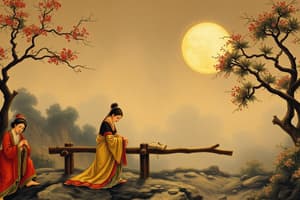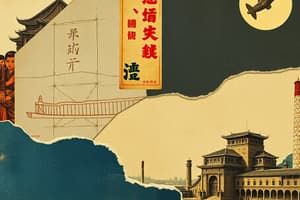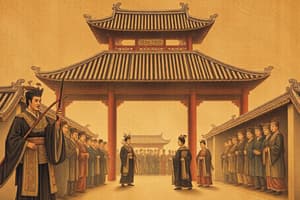Podcast
Questions and Answers
What significant change did Yong Le implement as emperor of the Ming dynasty?
What significant change did Yong Le implement as emperor of the Ming dynasty?
- He built the Forbidden City in Beijing (correct)
- He moved the capital to Nanjing
- He established the Civil Service Exams
- He expanded the Grand Canal
Which of the following was a reason for the weakening of the Yuan dynasty after Kublai Khan’s death?
Which of the following was a reason for the weakening of the Yuan dynasty after Kublai Khan’s death?
- Increased loyalty among officials
- Wars with neighboring states
- The rise of powerful military officers
- Corruption among officials (correct)
What was one consequence of the strong government established during the Ming dynasty?
What was one consequence of the strong government established during the Ming dynasty?
- Decrease in agricultural production
- Abandonment of the Silk industry
- Increased foreign invasions
- Economic growth and stability (correct)
Who led the seven voyages of exploration during the Ming dynasty?
Who led the seven voyages of exploration during the Ming dynasty?
What was a primary reason for the cessation of Zheng He's voyages?
What was a primary reason for the cessation of Zheng He's voyages?
What was the primary focus of Chinese literature during the Ming dynasty?
What was the primary focus of Chinese literature during the Ming dynasty?
Which of the following was TRUE about the agricultural advancements during the Ming dynasty?
Which of the following was TRUE about the agricultural advancements during the Ming dynasty?
What role did the Forbidden City serve during the Ming dynasty?
What role did the Forbidden City serve during the Ming dynasty?
Flashcards
The Ming Dynasty
The Ming Dynasty
The Ming dynasty was a period of great change in China, following the Yuan dynasty. It is well-known for its strong leadership, thriving economy, and notable contributions to arts and culture.
Who founded the Ming Dynasty?
Who founded the Ming Dynasty?
Hong Wu, the founder of the Ming Dynasty, brought peace and order after a period of Mongol rule. He reunified China and established Nanjing as his capital.
Who moved the capital to Beijing?
Who moved the capital to Beijing?
Yong Le, the son of Hong Wu, moved the capital to Beijing and built the Imperial City, a symbol of power and authority.
What did the Ming Dynasty restore?
What did the Ming Dynasty restore?
Signup and view all the flashcards
What economic advancements were made during Ming Dynasty?
What economic advancements were made during Ming Dynasty?
Signup and view all the flashcards
Who led the Ming Dynasty explorations?
Who led the Ming Dynasty explorations?
Signup and view all the flashcards
Why did China stop the explorations?
Why did China stop the explorations?
Signup and view all the flashcards
What marked the beginning of China's isolation?
What marked the beginning of China's isolation?
Signup and view all the flashcards
Study Notes
The Ming Dynasty
- The Yuan dynasty weakened after Kublai Khan's death, leading to weak emperors and official corruption.
- Zhu Yuanzhang, a military officer, ended Mongol rule, reunited China, established the capital in Nanjing, and founded the Ming dynasty.
- Hong Wu, the first Ming emperor, established peace and order, but ruled with harshness and distrust. He punished officials for suspected treason.
- Yong Le, Hong Wu's son, moved the capital to Beijing and built the imperial city (Forbidden City).
- The Ming emperors brought back the civil service exams.
- Peace and security fostered economic growth, with improved agriculture, canal repairs, road building, and reforestation.
- The Grand Canal was expanded to facilitate trade between North and South China.
- Increased agricultural production and the Silk Road, along with government support, led to growth of cotton farming and weaving.
- Chinese writers wrote influential novels, such as the Romance of the Three Kingdoms, that featured military conflicts.
- Traditional dramas were banned under the Mongols but revived during the Ming.
Chinese Exploration
- Ming emperors commissioned a large fleet of ships (junks) for voyages to other kingdoms.
- Zheng He, a Chinese Muslim, led seven voyages to various regions, primarily Southeast Asia but also reaching Western India and the city-states of East Africa.
- The voyages sought trade and tribute from weaker kingdoms, demonstrating Chinese power and influence.
- However, Chinese officials deemed the voyages costly, leading to their cessation after Zheng He's death.
Studying That Suits You
Use AI to generate personalized quizzes and flashcards to suit your learning preferences.




